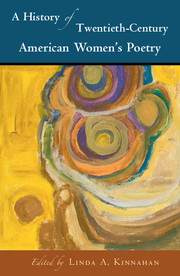Book contents
- Frontmatter
- Contents
- List of figures
- List of contributors
- Preface
- Acknowledgments
- PART I MAPPINGS AND CHRONOLOGIES
- PART II ETHNICITY, RACE, AND IDENTITY
- PART III MATERIAL FORMATIONS
- PART IV LINEAGES, TIES, AND CONNECTIONS
- PART V FORM, LANGUAGE, AND TEXT
- 19 Forgiving the Sonnet: Modernist Women's Love Poetry and the Problem of Sentimentality
- 20 The “do it yourself” Avant-Garde: American Women Poets and Experiment
- 21 Visual Poetics
- 22 Poetry and Technology
- PART VI CODA
- Bibliography
- Index
22 - Poetry and Technology
from PART V - FORM, LANGUAGE, AND TEXT
Published online by Cambridge University Press: 05 June 2016
- Frontmatter
- Contents
- List of figures
- List of contributors
- Preface
- Acknowledgments
- PART I MAPPINGS AND CHRONOLOGIES
- PART II ETHNICITY, RACE, AND IDENTITY
- PART III MATERIAL FORMATIONS
- PART IV LINEAGES, TIES, AND CONNECTIONS
- PART V FORM, LANGUAGE, AND TEXT
- 19 Forgiving the Sonnet: Modernist Women's Love Poetry and the Problem of Sentimentality
- 20 The “do it yourself” Avant-Garde: American Women Poets and Experiment
- 21 Visual Poetics
- 22 Poetry and Technology
- PART VI CODA
- Bibliography
- Index
Summary
The twentieth century saw an exponential increase in the forms and functions of technology; in the experience of many the century culminated in a saturation of the economic, social, and cultural world by technology. Indeed, in various predictions the century supposedly would end in a techno-apocalypse on December 31, 1999, when the “millennium bug” Y2K would cause massive computer mainframe malfunction and the breakdown of networks and infrastructure. Across the century technologies underlying revolutions in communication, transportation, architecture, medicine, industry, war, and media offered models through which poetry was both read and written and posed particular questions and opportunities for women poets.
The relationship of poetry to technology is a complex one, foregrounding for some writers the incompatibility of the lyric text with the machinic processes and perspectives of a technological and industrial world. The nineteenth century had seen the decline of the public function of poetry; the conventional academic reading of this trend discerns science and technological progress replacing poetry as the discourse that best engaged the contemporary public imagination. But, exploring the way that poetry developed across the long twentieth century, it becomes apparent that poetry is not in opposition to the technological; as Carrie Noland proposes, it is necessary to acknowledge the “extensive ties, both practical and epistemological, linking capitalist expansion and its corollaries, modern industrialization and electronic information processing, to poetic forms of subjective expression.” Poetry itself works dynamically with, in, and as technology in this century, and the position of women poets in this dynamic engagement is key to understanding the politics and aesthetics of their work. Twentieth-century poetry by American women does not simply enlist the technological as tool and discipline, though these aspects of technology are central to women's distinctive participation in digital poetics in the 1980s and 1990s. American women's poetry points, in a heterogeneity of modes, toward the novel ontological and epistemological frames generated by the twentieth-century technological imagination.
Martin Heidegger's theorization of technology was an influential one for the twentieth century, and a paradoxically enabling one for the poet. For Heidegger technology itself is not dangerous, but its essence as enframing (Gestell) means that everything (the world and the individual) are ordered as a “standing-reserve” to be utilized, a mode of existence at odds with any kind of authentic existence as defined by Heidegger.
- Type
- Chapter
- Information
- A History of Twentieth-Century American Women's Poetry , pp. 359 - 374Publisher: Cambridge University PressPrint publication year: 2016

